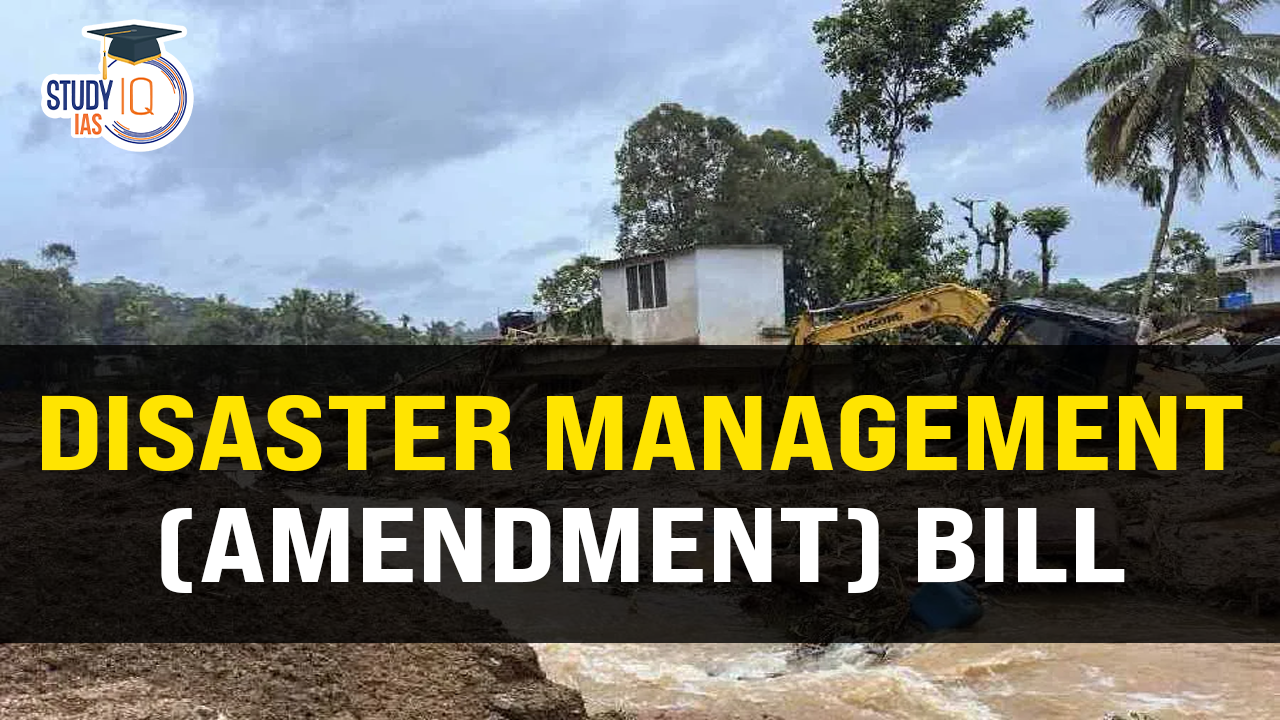Table of Contents
Context:
- Recently, the central government introduced the Disaster Management (Amendment) Bill in the Lok Sabha.
- The Bill is introduced in the context of climate-induced disasters.
Background of Disaster Management Bill
- The original Disaster Management Act, 2005 aimed to create institutional mechanisms for disaster management, prevention, and mitigation.
- The Act established Authorities and Committees at national, state, and district levels for coordinated disaster response.
About Disaster Management Bill
- Purpose: To amend the Disaster Management Act, 2005 for enhanced disaster management capabilities.
- Objectives:
- Establish Urban Disaster Management Authorities for state capitals and large cities with Municipal Corporations.
- Strengthen the National Disaster Management Authority (NDMA) and State Disaster Management Authorities.
- Create a “State Disaster Response Force” by the State Government.
Key Amendments Proposed in the Bill
- Urban Disaster Management Authority: Establishment in state capitals and large cities with Municipal Corporations to enhance urban disaster management.
- Strengthening NDMA and State Authorities: Empower NDMA and State Disaster Management Authorities to prepare disaster plans at national and state levels.
- These responsibilities previously held by the National Executive Committee and State Executive Committees.
- State Disaster Response Force: Provision for a dedicated force at the state level for immediate disaster response.
- Clarity and Convergence: Bring more clarity in roles and responsibilities of various Authorities and Committees.
- Statutory status for pre-Act organisations like the National Crisis Management Committee and the High-Level Committee.
- Disaster Database: Creation of a comprehensive disaster database at both national and state levels.
Expected Outcomes
- Enhanced coordination and effectiveness in disaster management across urban areas.
- Improved disaster preparedness and response through institutional strengthening and dedicated disaster response forces.
- Better data management for informed decision-making in disaster management.
What are the Concerns Related to Recent Amendments?
- Concerns Over Financial Centralization: The Bill dilutes the wording of the National Disaster Response Fund (NDRF) by removing specific purposes for which the fund shall be used.
- Excessive centralization in decision-making related to disaster funds has been a significant concern, especially during severe disasters.
- There have been instances of delayed responses from the central government, as seen in the denial and delayed disbursement of disaster relief funds to Tamil Nadu and Karnataka.
- Inadequate Definition of ‘Disaster’: Globally, there is consensus to classify heatwaves as climate-related disasters due to their significant impact on ecosystems and human health.
- However, the Act failed to accommodate climate-induced disasters like heatwaves.
- This decision aligns with the 15th Finance Commission’s stance, which does not support expanding the scope of notified disasters.
- And also does not consider the localised and prolonged nature of climate-induced disasters, which may have similar impacts to traditional disasters like floods.
- However, the Act failed to accommodate climate-induced disasters like heatwaves.
| Facts |
|
Conclusion
To truly enhance disaster management, there is a need for a more balanced approach that empowers states, ensures financial preparedness, and aligns with global standards in recognizing and responding to emerging climate-related threats.


 Arbitration in India, Types, Benefits, R...
Arbitration in India, Types, Benefits, R...
 Revised Detention Policy Implemented by ...
Revised Detention Policy Implemented by ...
 Linking Aadhaar with Voter ID Endangers ...
Linking Aadhaar with Voter ID Endangers ...





















